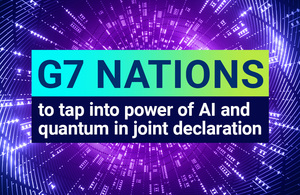G7 nations to harness AI and innovation to drive growth and productivity
G7 nations have signed an agreement to unite and harness the innovative potential of AI to usher in a new era of global productivity and economic growth.

- Countries agree to work together on new report exploring how to ramp up AI adoption
- New semiconductor group to deepen collaboration on R&D priorities and sustainable manufacturing
- AI toolkit to support safe and trustworthy deployment of AI across the public sector
G7 nations have signed an agreement to unite and harness the innovative potential of AI to usher in a new era of global productivity and economic growth.
The Ministerial Declaration – which is the first of its kind – was signed on the last day of the Industry Tech and Digital meeting of the G7 in Italy, and is yet another step in the government’s plan to deliver the long-term change our country needs to deliver a brighter future for Britain, and improve economic security and opportunity for everyone.
It will see countries commit to work on a new joint report exploring the factors behind the uptake of AI tech by businesses, helping inform policy makers across the grouping. This is an effort the UK has already kickstarted domestically through the AI Opportunity Forum, which was announced by the Prime Minister and held its first meeting in February, bringing together some of the biggest names in tech and business such as Microsoft, Google, and Vodafone.
The new report will improve the G7’s shared understanding of tech collaboration, assessing different approaches to policy and offering a set of recommendations which will support companies to successfully roll out safe and trustworthy AI. It will be published by the end of the year.
AI deployment in the public sector is also highlighted as a critical focus for the G7 in the declaration. To ensure countries have the tools they need to roll out the technology to improve public services, a toolkit will be developed by the end of Italy’s G7 Presidency which will set out practical principles for safe and trustworthy AI which can then be used to inform policy making. This will mean that AI can drive forward tailored public services which better serve the needs of citizens across the globe.
The UK continues to cement its place as world leader in safe and trustworthy AI, after hosting the world’s first major summit on AI safety at Bletchley Park in November, and through the ongoing work of the AI Safety Institute. Backed by an initial £100 million in funding, the Institute is the world’s first state-backed body dedicated to AI safety, with the UK having spent more money on AI safety than any other country.
UK Secretary of State for Science, Innovation, and Technology, Michelle Donelan, said:
AI is already an extraordinary force for good in our society, with vast potential to tackle some of the world’s biggest challenges. I am determined that we continue to drive forward efforts to harness the enormous potential of these emerging technologies to unlock new opportunities and turbocharge productivity.
Doing this in lockstep with our G7 partners adds to the rich history we already share of improving the lives of citizens across the globe, working together to address a shared set of challenges. Our two days of talks in Italy have laid the foundations for us to further this work in the age of AI and emerging tech, delivering transformative change through our shared expertise and innovation.
UK Minister for Tech and the Digital Economy Saqib Bhatti said:
It has been an enormously productive two days of talks in Italy, and I am very encouraged by the agreements we’ve reached.
The UK has long been a leading voice on the global stage for greater collaboration across Science, Innovation, and Technology. Supported by this agreement, we will continue to work shoulder-to-shoulder with our G7 partners to realise the huge benefits emerging technologies like AI and Quantum can bring.
Today’s Ministerial Declaration also calls for a doubling of efforts to boost the growth of the international Quantum sector, with the upskilling of workers and an exchange of expertise between the G7, academia, and industry sitting at the heart of that effort. Also captured is the important role of semiconductors in driving forward the adoption of emerging technologies, and a commitment to establish a new Point of Contact Group on semiconductors. This group will help countries to share best practice on issues affecting the industry, such as research and development priorities and sustainable manufacturing.
The UK’s delegation has been led by Technology Secretary Michelle Donelan and Minister Bhatti for the talks, which took place in Verona and Trento on 14 and 15 March. As part of the gathering, Michelle Donelan also announced the launch of the Horizon Europe international campaign in Spain and Italy, as the UK moves to strengthen links with researchers in mainland Europe.
Italy and the UK share an enduring partnership across various aspects of science and technology. In AI alone, both countries have been drawing on one another’s expertise over the past 12 months through a dedicated researcher exchange programme, run through the Alan Turing Institute. More than 20 UK researchers have spent time in Italian universities through this programme, which removes potential financial barriers by supporting researchers to cover their associated travel and accommodation costs.
Co-operation also stretches further afield with the UK and Italy being founding members of CERN, the European organisation for nuclear research, with both countries also working closely together on the project to build the world’s largest radio telescope through the Square Kilometre Array Observatory. Italian and UK researchers have also worked in partnership to bring a potential HIV-AIDS vaccine to clinical trials through the European AIDS Vaccine Initiative, sharing expertise to tackle one of the world’s major global health challenges.